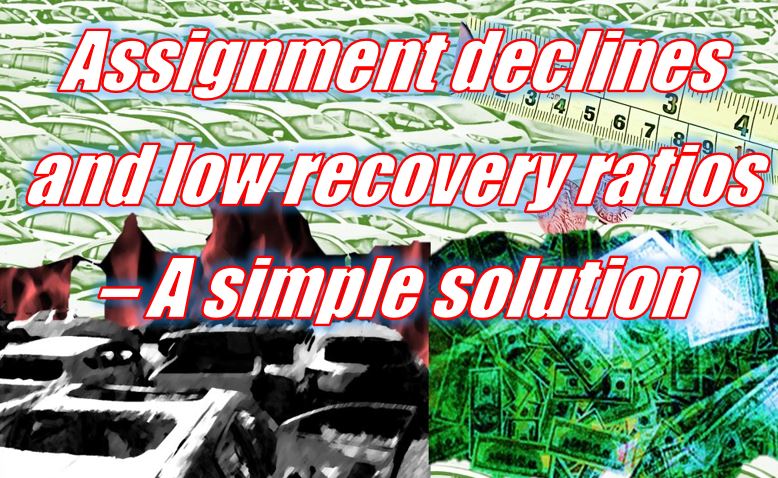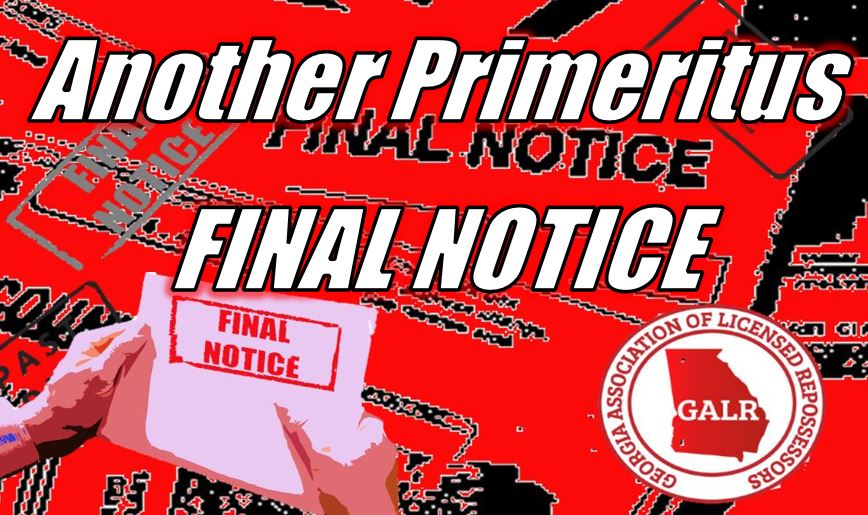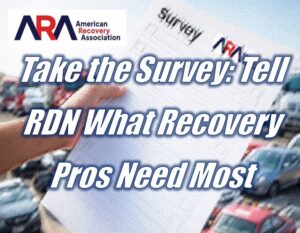With 2022 coming to an end, it’s that time of year when we tend to look back at the year as it was. I know, you’re probably thinking, “here’s another one of those stupid best of the year articles” that drags out old news for holiday season filler content. Well, I guess it is, but rather than just wax on about my own views of the past year, I thought I’d rather share with you the stories that you, the readers viewed the most in order of site volume.
So, away we go!
 #10 – Hard times for repo forwarding founder
#10 – Hard times for repo forwarding founder
Okay, I confess. This article was a little facetious. No, Patrick Willis, founder of ARS is probably not going broke. It was just an odd article to find.
It’s rare that the repossession industry gets the opportunity to see the wealth that was built on a forwarding operation. And to be perfectly honest, Patrick Willis’ income comes from real estate development and other forms of investment.
Patrick comes from old school repo blood and started his empire with one small agency decades ago. While he has amassed a small fortune
ARS, like most forwarding companies, are lightning rods for industry discourse. To their credit, they are one of the industries biggest contributors to the Recovery Agents Benefit Fund and the Vendor Relations VP, Dave Baker even sits on the RABF Board of Directors.
But that doesn’t mean that their name didn’t come up a lot in 2022 as evidenced by a scathing guest editorial by ARS cofounder John Lewis and the number nine most read article of 2022.
 #9 – An agency letter to ARS – I don’t think so…
#9 – An agency letter to ARS – I don’t think so…
Guest editorials are always one of the most read. This one, came on the heels of John Lewis’s article titled “ARS Founder Speaks Out on Repossession Fees” and echoes the ever-persistent issue of fees.
This contribution came from Jason Karns, General Manager at Quality Recovery Service. His direct and to the point editorial well illustrated his opposition to the fee structure of American Recovery Service (ARS).
Perhaps the most powerful statement in it to me was; “How in the world can ARS still offer the same low-ball fee they did in 2009? It’s an Insult.:”
 #8 – Alliance of Illinois Repossessors to Require Storage on ALL Assignments!
#8 – Alliance of Illinois Repossessors to Require Storage on ALL Assignments!
I was a little surprised that this story wasn’t bigger than it was. It could just be a matter of timing as this announcement by the Alliance of Illinois Repossessors (AIR) was late in the year and didn’t get the benefit of later re-reads as some of the top three have.
Regardless, it did show a monumental stand against lender/forwarder demands for free storage by one of the newer state repossession associations that, by December at the time of this writing, , the same proposal was being taken into consideration by all of the other nine state associtaions .
How this all pans out across the nation is hard to say, but the AIR had already flexed their collective muscle in demanding fuel surcharges earlier in the year as well as demanding Primeritus pay up in their past due invoices. Both of which they were successful in achieving.
The AIR claims to be responsible for over 85% of all repossession activity in the state of Illinois and holds a greater amount of leverage than probably any other state at this point. They spearheaded the fuel surcharge initiative and are leading the way with storage as well.
While still relatively new, the AIR is without a doubt, the strongest of the state repossession associations that has ever existed. Their storage mandate is now being taken up by eight other state associations as well. This is growing quick and every agency owner should know by now, and there is no excuse for sitting on the side;lines now! those who who are putting this up for vote still.
 #7 – A fly on the wall – Ally discusses new repossession strategy
#7 – A fly on the wall – Ally discusses new repossession strategy
Scouring through Ally Bank’s investor meeting transcript, I’d stumbled across a veiled reference to their adoption of a new repossession strategy that they had hoped would help to fend off delinquencies. This was, at least, the excuse for an increase in delinquency that was brought up by one investment writer.
Their stated intent to give borrowers just a little more time to pay became a source of speculation from both me and Scott Jackson who suggested that perhaps Ally intended to cease their repossession assignment strategy and opt for the legal process of replevin.
Reasonable minds differ, which we did and I later responded in an editorial of my own which we’ll get to later.
 #6 – Assignment declines and low recovery ratios – A simple solution
#6 – Assignment declines and low recovery ratios – A simple solution
As previously mentioned, guest editorials tend to be some of the most heavily read. This one from Jeremy Cross, of International Recovery Systems, almost made the top five. In his writing. Jeremy pointed out some of the ever-growing problems persisting in the industry, inflation, staffing and fees.
Jeremy lays out a fairly simple solution to help combat these issues. One that already made the list. It seems to have caught on; Storage,
 #5 – Pricing Risk to Prevent Loss
#5 – Pricing Risk to Prevent Loss
Wes Carico of Nostalgic Towing has continued to provide some of the most informative and most read editorials through the years and definitely hit the mark with this one. Wes addressed many of the problems plaguing the industry such as non-payment for fees, adjusting rates to account for slow pays or no pays, and negotiating with forwarders.
A re-read of Wes’s articles would be time well spent for any agency owner from time to time. While Wes is busy working on his new Orca repossession workflow and business management application, I hope to hear something new from him before long.
 #4 – Anatomy of a Repossession Death
#4 – Anatomy of a Repossession Death
This story was brought to me by industry experts Mark Lacek and Ron Brown, who both found themselves serving as expert witnesses in the wrongful death case in the May of 2019, case of 71-year-old Albert Nduli of Houston who was run over during a recovery.
This article took a while to write because there were a lot of lessons to be learned in it. Lessons that could save lives and businesses. I still feel that the story of this tragedy should be required reading by all agents, owners, lenders and forwarders.
 #3 – The mythical repossession explosion, and the real data
#3 – The mythical repossession explosion, and the real data
Over the summer, click bait alleging that repossession volume was soaring ran through the internet through various news sources. While the industry was still suffering from a repossession volume drought, these catchy headlines didn’t seem to hold any veracity to me. So, I dug into the data.
What I did find, was that delinquency was showing signs of growth at the end of Q2, 2022, it was at that point, still far lower than even the pre-pandemic period, which wasn’t that high to start with. Taking the existing growth trends, I forecasted that we wouldn’t get back to pre-pandemic delinquency levels until the end of Q1, 2023.
Well, it’s already been a couple of months since I wrote this and we’ve already surpassed my projecrions. I think it’s safe to say, the dam cracks opeen by March. I’m not sure how the industry will handle the staff issues, but I still feel that a serious volume surge is coming.
 #2 – Another FINAL NOTICE to Primeritus
#2 – Another FINAL NOTICE to Primeritus
As well documented, Primeritus had a rough year. But not as rough as the agencies who’d been waiting for past due invoices to get paid. Some as much as $75K and as long as a year.
This didn’t sit well with first, the Alliance of Illinois Repossessors announcement making a final demand for all invoices 45+ days past due to be paid no later than Friday September 9, 2022. This was later followed by the Georgia Association of Licensed Repossessors (GALR) who made a similar demand.
Other announcements from the TexasARP, CALR and a joint memo with Primeritus by the ARA, but this article appears to have had a greater impact, or at least garnered greater attention.
On a side note, the AIR reported that Primeritus did meet their demands and last I heard, progress was made in Georgia. But there was never any admission of how much in past due invoices was owed or how much was paid out.
 #1 – Replevin vs. Repossession – A snowballs chance
#1 – Replevin vs. Repossession – A snowballs chance
As previously mentioned in number seven, I had written a response to Scott Jackson’s editorial titled “Be Careful What You Wish For” suggesting that Ally Bank may opt to cease involuntary repossessions and refer all delinquency for replevin/claim and delivery.
I’m not sure that I really countered all of Scott’s points in my editorial, but I feel that did a decent job of illustrating the negative financial impact that such a course of action would create.
I’m honestly a little surprised this was as heavily read as it was. Perhaps it just picks up good search engine clicks. After all these years of writing this stuff, I am still often wrong about what will bring in traffic.
Left Out
When I first saw the results, I was taken back by some of the stories that didn’t make the list. Especially many of the guest editorials and association contributions. These articles get a lot of views and reads each and I’m sure that if I added the combined views for every contribution from Ron Brown and the Eagle XX Group, the ARA or The Alliance of Illinois Repossessors, they would easily exceed any of these articles.
I look forward to sharing all of your editorials, press releases and announcements in the coming year, so if you have something to share with the industry, just reach out to me at [email protected].
On to 2023!
As big a year as 2022 was, with rising delinquency and a probable recession coming next year, I expect that 2023 will be huge. I would like to thank you all again for your support and wish you all the most successful year the repossession industry has seen in decades.
Thank you all again and,
Kevin Armstrong
Publisher/Writer











More Stories
Today is Fallen Agents Day – 2026
From Auction Cutting to Field Programming: The Structural Shift No One Budgeted For
Undercover ATF Pose as Repo Men to Take Down Illegal Gun Dealers
Gun Drawn on Friday the 13th Repo
National Dealer Association Responds to Senate Repossession Probe
AFSA – Setting the Repossession Records Straight